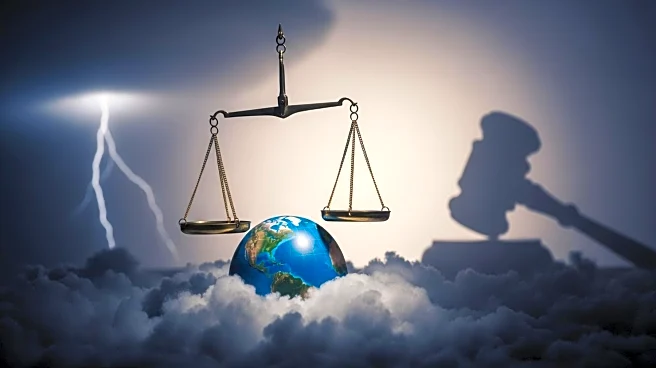What is the story about?
What's Happening?
The International Criminal Court (ICC) and the International Court of Justice (ICJ) are facing significant challenges in enforcing international law due to limited jurisdiction and lack of support from major powers like the United States, Russia, and Israel. The ICC, tasked with prosecuting individuals for serious crimes such as genocide and war crimes, struggles with enforcement as these countries are not members. Recently, the U.S. imposed sanctions on several ICC officials, accusing the court of judicial overreach, which has further complicated the ICC's efforts. This situation is exacerbated by ongoing global conflicts, such as those in Ukraine and Gaza, where leadership in powerful nations is perceived as increasingly self-serving, prioritizing political power over public service.
Why It's Important?
The challenges faced by the ICC and ICJ highlight a broader issue of accountability in international law. The lack of enforcement mechanisms and support from powerful nations undermines the ability of these institutions to uphold justice, potentially leading to a global environment where might makes right. This situation could embolden leaders to act with impunity, exacerbating conflicts and undermining efforts to resolve them peacefully. The U.S.'s stance, particularly its sanctions against ICC officials, signals a disregard for international judicial processes, which could have long-term implications for global governance and the rule of law.
What's Next?
The ongoing geopolitical tensions and the U.S.'s actions against the ICC may prompt discussions among international stakeholders about reforming these institutions to enhance their effectiveness. There could be calls for increased cooperation and support from non-member states to strengthen the ICC's mandate. Additionally, the international community may need to explore alternative mechanisms to ensure accountability and justice in global conflicts, especially in regions like Ukraine and Gaza, where the human toll continues to rise.
Beyond the Headlines
The erosion of accountability and the perceived shift from public service to power consolidation among global leaders raise ethical concerns about the future of international relations. The current trajectory suggests a potential decline in democratic values and respect for human rights, which could lead to increased instability and conflict worldwide. This situation underscores the need for a renewed commitment to upholding moral and ethical standards in governance and international diplomacy.















